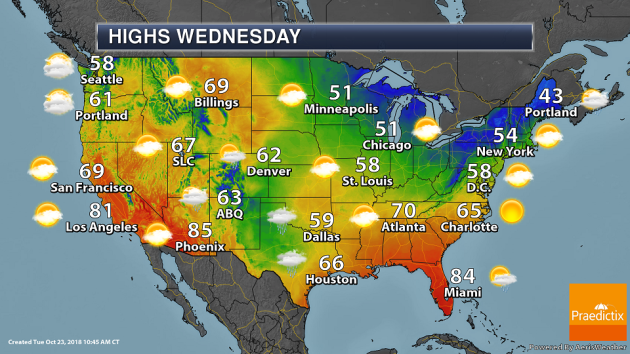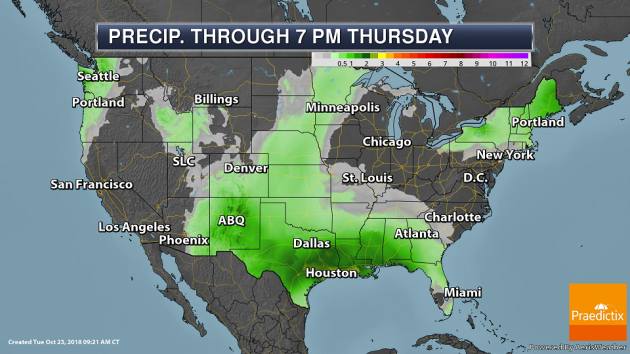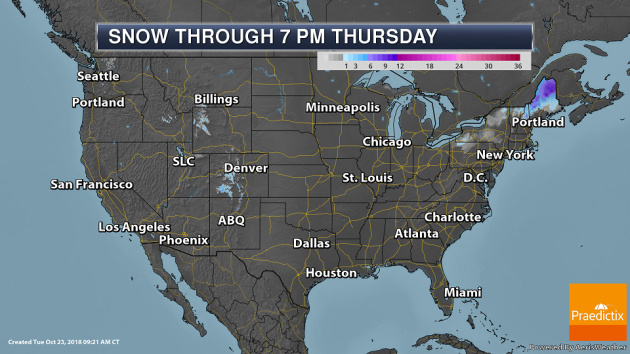National Weather Forecast

Rain will continue across Texas on Wednesday as moisture from Willa continues to funnel north as well as due to a stationary boundary across the Gulf of Mexico. Rain and snow will be possible across parts of the Northeast with a departing low. Meanwhile, an advancing system will produce rain across parts of the Northern and Central Plains.

The heaviest rain through 7 PM Thursday will be across parts of the Gulf Coast of Texas and Louisiana, where rainfall amounts of 3″+ are possible.

Heavy snow – in excess of 6″ in some spots – across parts of northern Maine through Wednesday night. Snow will accumulate in parts of the Rockies as well.
_______________________________________________
Ticks Are Killing an Alarming Number of Moose Thanks to Climate Change
More from Earther: “The horrifying effects of climate change are evident seemingly everywhere you look. Now, a report from researchers at the University of New Hampshire (UNH) suggests that climate change favorable to a parasite is impacting the moose population in New England. According to their findings, winter ticks that gorge themselves on a moose’s blood by the tens of thousands during the fall and winter were responsible for killing roughly seven in 10 moose calves over the course of the three-year study. The researchers, who have been studying the calves in New Hampshire and western Maine since 2014, published their findings in the Canadian Journal of Zoology in September, with UNH publishing a press release on the research this week. During each of those three years, the team examined 179 radio-marked young moose for parasites and their condition over the course of a four-month period. Of those calves they screened, 125—or nearly 70 percent—of the moose calves died. The researchers suspect this is primarily because of the winter tick.”
How the Bank Bailout Hobbled the Climate Fight
More from The New Republic: “Almost exactly a decade ago, as the Federal Reserve worked to stabilize a careening stock market, overleveraged banks, and underwater mortgage lenders, it made a decision that helped fundamentally reshape the global energy industry. In the middle of October 2008, the Fed agreed to bail out America’s big banks, even the ones that weren’t failing, like JP Morgan Chase, Citigroup, and Goldman Sachs. That decision continues to be hotly debated ten years later. But its profound environmental impacts are, quite often, overlooked. The bailout was one of the most significant turning points in America’s role in the global climate crisis and perhaps its most important piece of environmental legislation, ushering in a decade of fossil fuel investment that has set the fight to curb carbon emissions globally back decades.”
‘We need intense rainfall’: Drought cripples crucial German waterways
More from The Local Germany: “The docks are eerily quiet at Cologne’s main port on the mighty River Rhine, with hundreds of containers piled up and awaiting their journey north on one of Europe’s busiest commercial arteries. Months of scarce rainfall and hot sunny weather drove water levels on the Rhine to a record low, forcing ship operators to suspend services to keep vessels from running aground. “We haven’t had any new ships in Cologne since last week — they stop in Duisburg” 80 kilometres north, Oliver Grossmann, head of shipping company CTS, told AFP.”
_______________________________________________
Thanks for checking in and have a great Wednesday! Don’t forget to follow me on Twitter (@dkayserwx) and like me on Facebook (Meteorologist D.J. Kayser)!
– D.J. Kayser


